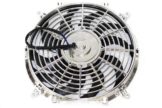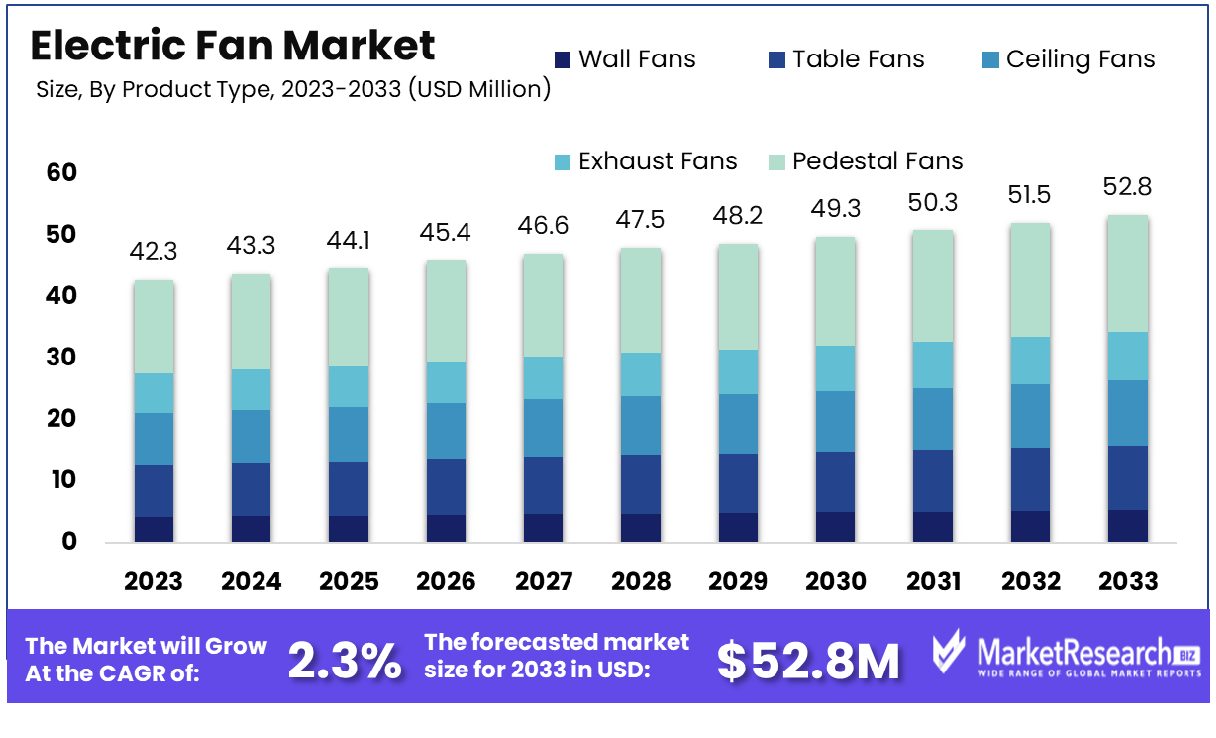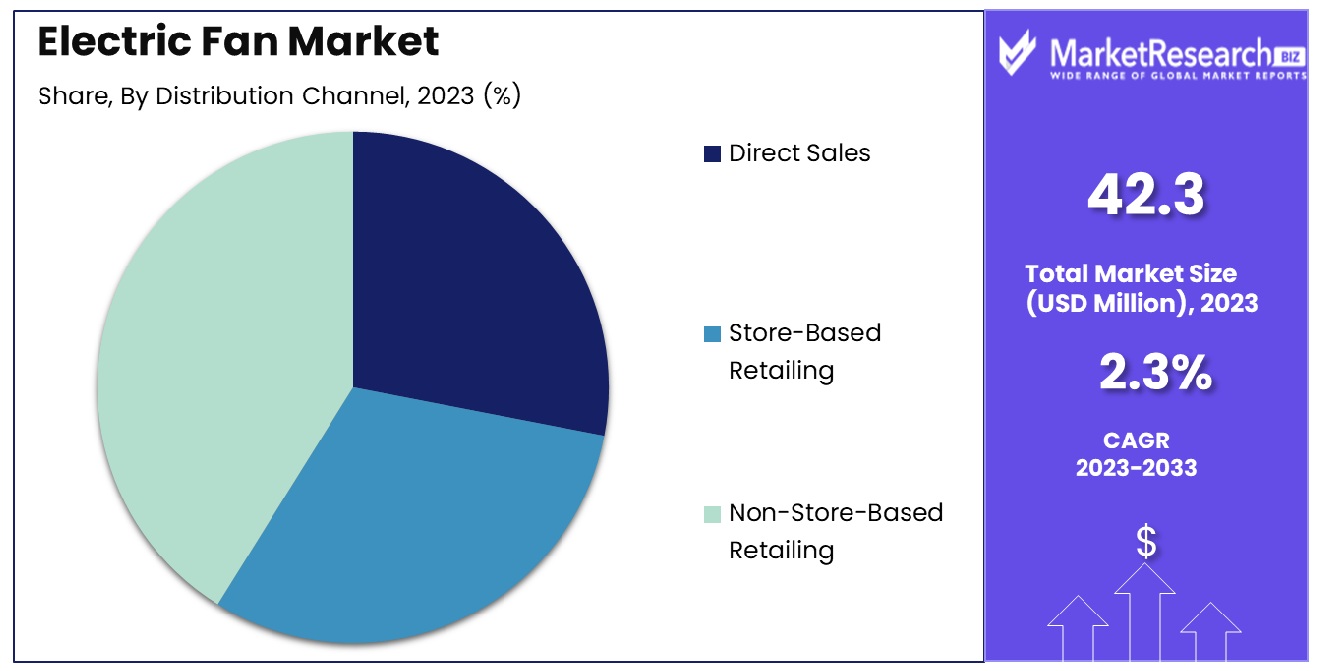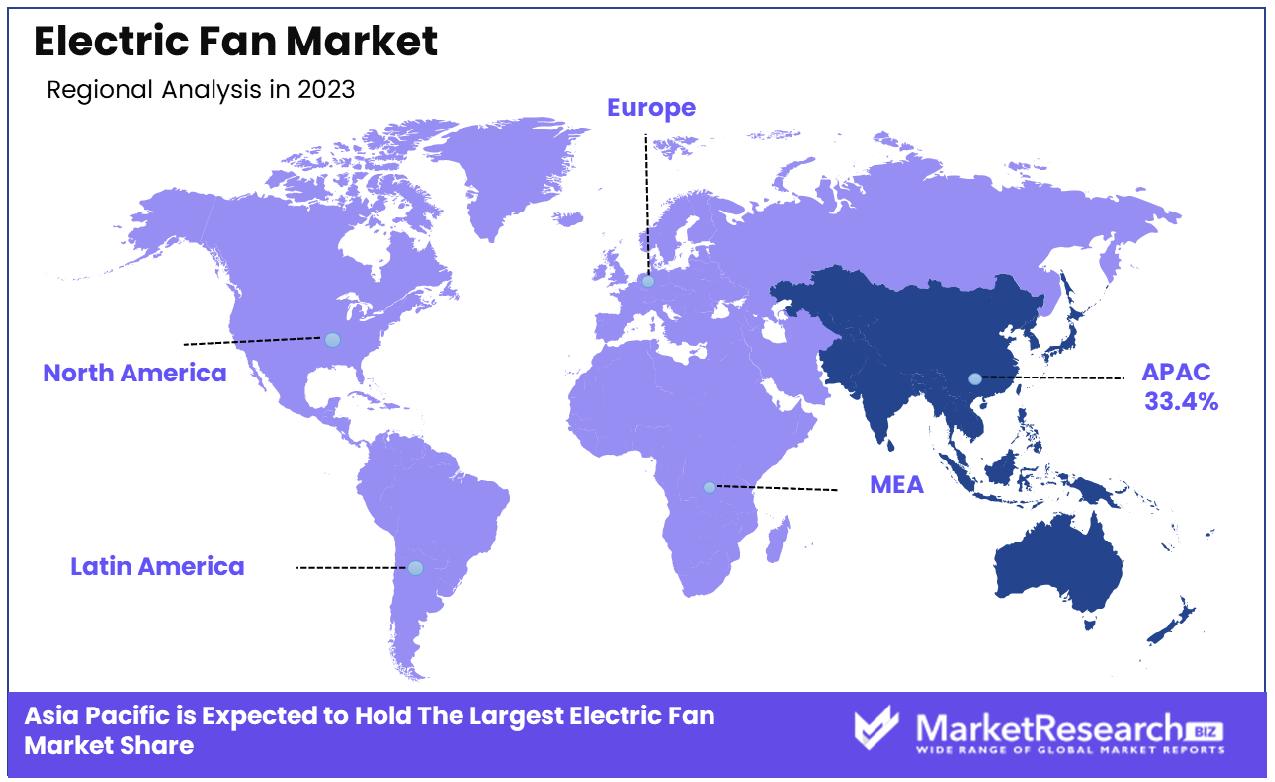
Global Electric Fan Market By Product Type(Wall Fans, Table Fans, Ceiling Fans, Exhaust Fans, Pedestal Fans), By Distribution Channel(Direct Sales, Store-Based Retailing, Non-Store-Based Retailing), By Application(Industrial Use, Household Use, Commercial Use), By Region And Companies - Industry Segment Outlook, Market Assessment, Competition Scenario, Trends, And Forecast 2024-2033
-
8789
-
June 2024
-
300
-
-
This report was compiled by Vishwa Gaul Vishwa is an experienced market research and consulting professional with over 8 years of expertise in the ICT industry, contributing to over 700 reports across telecommunications, software, hardware, and digital solutions. Correspondence Team Lead- ICT Linkedin | Detailed Market research Methodology Our methodology involves a mix of primary research, including interviews with leading mental health experts, and secondary research from reputable medical journals and databases. View Detailed Methodology Page
-
Quick Navigation
Report Overview
The Global Electric Fan Market was valued at USD 42.3 million in 2023. It is expected to reach USD 52.8 million by 2033, with a CAGR of 2.3% during the forecast period from 2024 to 2033.
The Electric Fan Market encompasses the industry segment dedicated to the manufacturing, distribution, and sale of electric fans. These devices, utilized across residential, commercial, and industrial settings, provide air circulation and cooling solutions. The market includes various product types such as ceiling fans, table fans, pedestal fans, and wall-mounted fans, each designed to meet specific consumer needs.
Growth drivers include rising urbanization, increasing disposable incomes, advancements in energy-efficient technologies, and heightened awareness of eco-friendly products. Key players focus on innovation, brand differentiation, and expanding their distribution networks to capture a larger market share in this competitive landscape.

The electric fan market is experiencing significant growth, driven by increasing consumer demand for energy-efficient cooling solutions and rising urbanization. The market's expansion can be attributed to advancements in technology, such as the integration of Internet of Things (IoT) capabilities into electric fans, enhancing their functionality and user experience. The shift towards smart homes and connected devices is propelling the adoption of IoT-enabled ceiling fans, which offer remote control and automated operation features.
This trend is expected to continue, given the robust growth projections of the IoT market, which reached $399.41 billion in 2022 and is anticipated to grow to $486 billion by 2023. Moreover, the necessity for enhanced security in smart IoT devices, including ceiling fans, underscores the importance of the IoT security market, forecasted to escalate from $3.35 billion in 2022 to $13.36 billion by 2028, at a CAGR of 26.36%.
Additionally, the increased focus on energy conservation is pushing manufacturers to develop fans with superior energy efficiency ratings. Government regulations and incentives promoting energy-saving appliances are further catalyzing market growth. Emerging markets in Asia-Pacific, Latin America, and Africa are witnessing substantial demand due to rapid urbanization and rising disposable incomes.
In contrast, mature markets in North America and Europe are seeing a steady replacement demand for advanced and efficient models. The competitive landscape is marked by strategic collaborations and innovations among key players aiming to capture a larger market share. Overall, the electric fan market is poised for sustained growth, driven by technological advancements, regulatory support, and evolving consumer preferences.
Key Takeaways
- Market Growth: The Global Electric Fan Market was valued at USD 42.3 million in 2023. It is expected to reach USD 52.8 million by 2033, with a CAGR of 2.3% during the forecast period from 2024 to 2033.
- By Product Type: Pedestal fans led product types, accounting for 36% of the market.
- By Distribution Channel: Non-store-based retailing captured 60% dominance in distribution channels.
- By Application: Industrial use was the top application, comprising 42% of usage.
- Regional Dominance: Asia Pacific leads the electric fan market with a 33.4% share.
- Growth Opportunity: In 2023, the global electric fan market is growing due to increased demand in developing regions and the integration of air purification features, appealing to health-conscious consumers.
Driving factors
Rising Demand for Premium Fans
The electric fan market is experiencing significant growth due to the rising demand for premium fans. Consumers are increasingly inclined towards high-quality, aesthetically pleasing, and technologically advanced fans. Premium fans often come equipped with features such as remote controls, energy efficiency, and smart home systems integration, catering to the needs of modern households.
This shift towards premiumization is driven by higher disposable incomes, changing lifestyle preferences, and a growing awareness of energy conservation. As a result, manufacturers are focusing on innovative designs and advanced functionalities, thereby driving the market forward.
Increased Demand for Cooling Solutions
The escalating global temperatures and the increased prevalence of heat waves have led to a heightened demand for effective cooling solutions. Electric fans, being a cost-effective and energy-efficient alternative to air conditioning, have seen a surge in adoption. According to recent statistics, there has been a notable rise in the sales of electric fans in regions experiencing extreme heat.
This trend is further bolstered by the increasing awareness of the environmental impact of air conditioning systems, prompting consumers to opt for more sustainable cooling options. Consequently, the market for electric fans is expanding as they provide a practical solution to the growing need for cooling in both residential and commercial spaces.
Urbanization and Construction Activities
Urbanization and the surge in construction activities are key factors contributing to the growth of the electric fan market. The rapid expansion of urban areas has led to an increased demand for residential and commercial buildings, which in turn drives the need for electrical appliances, including fans. The construction boom in emerging economies, particularly in Asia-Pacific and Africa, has created substantial opportunities for market players.
Additionally, government initiatives focused on infrastructure development and housing projects are further fueling the demand. This urban expansion not only increases the volume of electric fans required but also stimulates the demand for diverse models catering to different architectural styles and functional requirements.
Restraining Factors
Supply Chain Disruptions
Supply chain disruptions are a significant restraining factor affecting the growth of the electric fan market. The global supply chain has been impacted by several issues, including transportation delays, shortages of raw materials, and logistical challenges, particularly exacerbated by events such as the COVID-19 pandemic. These disruptions lead to increased production costs and delays in product delivery, which can hinder market expansion.
For instance, the scarcity of critical components like electric motors and electronic chips has constrained the manufacturing capacities of electric fan producers. Consequently, companies face difficulties in meeting market demand on time, affecting their sales and profitability. The uncertainty in the supply chain necessitates companies to explore alternative sourcing strategies and invest in supply chain resilience, which may further increase operational costs and impact market growth negatively.
Dependence on Client Performance
The electric fan market's growth is also heavily influenced by its dependence on client performance. Major clients, including retail chains, construction companies, and commercial entities, play a crucial role in driving demand. Economic downturns or financial instability within these client sectors can directly impact their purchasing power and investment capabilities. For instance, during periods of economic recession, construction activities may slow down, reducing the demand for electric fans in new buildings.
Similarly, retail clients may cut down on inventory or delay new orders due to decreased consumer spending. This dependency creates a ripple effect, where the performance of end-use industries significantly dictates the market dynamics for electric fans. To mitigate this risk, manufacturers need to diversify their client base and explore new market segments, which may require substantial marketing and sales efforts. Therefore, the reliance on client performance introduces volatility and unpredictability into the market, restraining its consistent growth trajectory.
By Product Type Analysis
Pedestal fans, representing 36% of the market by product type, dominate this segment significantly.
In 2023, Pedestal Fans held a dominant market position in the By Product Type segment of the Electric Fan Market, capturing more than 36% of the market share. This segment outperformed other categories including Wall Fans, Table Fans, Ceiling Fans, and Exhaust Fans. The preference for Pedestal Fans can be attributed to their versatility and mobility, which allow users to easily move the unit from one room to another, catering to personalized cooling needs.
Wall Fans and Ceiling Fans followed, with market shares of 22% and 18% respectively. The demand for Wall Fans is driven by their space-saving design, making them ideal for compact urban dwellings, while Ceiling Fans remain popular due to their efficiency in air circulation across larger areas.
Table Fans accounted for 15% of the market. Their affordability and convenience for personal use continue to sustain their market presence. Meanwhile, Exhaust Fans held the smallest share at 9%, utilized primarily for ventilation purposes in residential and commercial settings.
The segmentation of the Electric Fan Market indicates a strong consumer preference for functional adaptability and energy efficiency. Pedestal Fans, in particular, have seen increased adoption due to their effectiveness in diverse environmental conditions and settings. This trend is expected to continue, influencing market dynamics and competitive strategies within the industry. The ongoing innovation and enhancement in fan technology, aimed at increasing energy efficiency and incorporating smart features, are likely to further shape the market landscape.
By Distribution Channel Analysis
Non-store-based retailing accounts for 60% of sales by distribution channel, leading in market distribution methods.
In 2023, Non-Store-Based Retailing held a dominant market position in the By Distribution Channel segment of the Electric Fan Market, capturing more than 60% of the market share. This channel surpassed both Direct Sales and Store-Based Retailing, which accounted for 20% and 20% of the market respectively. The substantial lead of Non-Store-Based Retail is largely due to the increasing consumer preference for online shopping, amplified by the convenience and breadth of product availability it offers.
The proliferation of e-commerce platforms and the enhancement of logistics and supply chain efficiencies have significantly contributed to the growth of non-store-based retail channels. Consumers appreciate the ability to compare prices, read reviews, and check product specifications online, which has driven the shift away from traditional retail methods.
Store-Based Retailing, although evenly matched with Direct Sales, continues to play a crucial role, particularly through specialty stores and home appliance outlets where consumers can experience products firsthand. However, the growth in this segment is relatively slower compared to the digital marketplace.
Direct Sales remain vital for niche markets and professional segments where manufacturers prefer direct interaction with their customers to offer customized solutions.
The dominance of Non-Store-Based Retailing is anticipated to strengthen as digital technologies evolve and consumer behaviors continue to shift toward online platforms. This trend is reshaping the competitive landscape, compelling traditional and store-based retailers to innovate and integrate more digital strategies into their business models to retain market relevance.

By Application Analysis
Industrial use constitutes 42% of applications, making it the predominant sector for this product category.
In 2023, Industrial Use held a dominant market position in the By Application segment of the Electric Fan Market, capturing more than 42% of the market share. This was followed by Household Use and Commercial Use, which accounted for 33% and 25% of the market, respectively. The strong performance of the Industrial Use segment is primarily driven by the extensive deployment of electric fans in manufacturing facilities, warehouses, and other industrial settings, where they are essential for maintaining air quality and providing necessary ventilation.
The significant demand within the Industrial Use segment is attributed to the stringent regulatory standards concerning workplace safety and environmental control, which mandate effective ventilation solutions. Additionally, the adoption of high-capacity, durable electric fans capable of operating in harsh industrial environments contributes to the segment's dominance.
Household Use also represents a substantial portion of the market, driven by the rising global temperatures and the increasing need for affordable cooling solutions in residential areas. Innovations in product design and energy efficiency have made electric fans a popular choice for households.
Commercial Use, while smaller in comparison, is bolstered by the utilization of electric fans in offices, retail spaces, and hospitality settings. This segment's growth is supported by the ongoing expansion of commercial infrastructure and increased awareness of energy conservation, which promotes the use of electric fans as a supplementary cooling method alongside air conditioning systems.
The trends indicate ongoing opportunities for market expansion, particularly through innovations that enhance energy efficiency and functionality, meeting the diverse needs of each segment.
Key Market Segments
By Product Type
- Wall Fans
- Table Fans
- Ceiling Fans
- Exhaust Fans
- Pedestal Fans
By Distribution Channel
- Direct Sales
- Store-Based Retailing
- Non-Store-Based Retailing
By Application
- Industrial Use
- Household Use
- Commercial Use
Growth Opportunity
Demand Surge in Developing Regions
In 2023, the global electric fan market is witnessing a significant upsurge in demand from developing regions. This growth can be attributed to the escalating urbanization and rising household incomes, which enhance the accessibility of electrical appliances to a broader consumer base. Additionally, climatic changes leading to longer and hotter summers have also escalated the demand for electric fans.
Emerging markets, particularly in Asia and Africa, are seeing rapid growth due to these factors, coupled with the increasing awareness of energy-efficient appliances. As urban populations swell, the compact and energy-efficient nature of modern electric fans makes them an ideal choice for densely populated areas, driving further market expansion.
Integration of Air Purification Features
The integration of air purification features into electric fans represents a significant innovation within the industry, catering to the growing consumer demand for multifunctional appliances. This trend is particularly pronounced amid heightened health awareness following global health crises, where air quality has become a paramount concern for consumers. The added functionality of air purification not only increases the utility of electric fans but also offers manufacturers a competitive edge in a saturated market.
This development has led to the premiumization of the product category, with consumers willing to invest in higher-priced units that promise additional health benefits. This trend is expected to boost market growth by attracting health-conscious consumers and those living in areas with poor air quality, thereby expanding the customer base for these advanced products.
Latest Trends
Minimalist and Modern Aesthetics
In 2023, the global electric fan market will be increasingly influenced by consumer preferences for minimalist and modern aesthetics. This trend reflects a broader shift towards sleek, functional design in home appliances, aligning with contemporary interior decor themes. Manufacturers are responding by producing fans that not only perform efficiently but also serve as aesthetic enhancements to living spaces.
Features such as slim profiles, neutral color palettes, and hidden controls are prevalent, catering to the minimalist design preference. This shift is not merely cosmetic; it represents a deeper alignment with lifestyle choices where simplicity and functionality converge, making the modern electric fan both a practical and decorative addition to homes.
Increased Use of Sustainable Materials
Sustainability is becoming a cornerstone of product development in the electric fan market, as environmental concerns drive consumer purchasing decisions. In 2023, there is a notable increase in the use of sustainable materials in the manufacturing of electric fans. Companies are leveraging recycled plastics and biodegradable materials to reduce environmental impact.
Additionally, the emphasis on sustainability extends to the entire product lifecycle, including packaging, which is increasingly made from recyclable materials. This trend not only responds to consumer demand for environmentally friendly products but also aligns with global regulatory pressures to reduce waste and carbon footprints. As a result, the use of sustainable materials is not only an ethical decision but also a strategic differentiation factor in the competitive market landscape.
Regional Analysis
The Asia Pacific electric fan market commands a substantial 33.4% share, driven by vast populations and rising temperatures.
The global electric fan market exhibits diverse dynamics across different regions, with Asia Pacific leading at 33.4% market share. This dominance is fueled by high population densities and escalating temperatures, particularly in emerging economies such as India and China. The region's market is further bolstered by rapid urbanization and increasing disposable incomes, making electric fans an accessible commodity for a growing middle class.
In North America, the market is characterized by a preference for advanced technology and energy-efficient products. This region sees a steady demand for electric fans, particularly for models integrating smart features such as remote controls and IoT connectivity, catering to a tech-savvy consumer base.
Europe's market reflects a high demand for eco-friendly and energy-efficient appliances. European consumers are highly sensitive to sustainability, driving demand for electric fans made from recycled materials and those offering superior energy efficiency. This trend is supported by stringent EU regulations on energy consumption and environmental impact.
The Middle East & Africa (MEA) region shows growth potential, driven by climatic needs and economic development. The market is expanding, particularly in urban areas where rising temperatures and increased standards of living contribute to the demand for electric fans.
Latin America, while smaller in comparison, is witnessing growth due to increasing urban populations and warmer climates. Economic stabilization in key countries such as Brazil and Mexico is improving consumer purchasing power, which is likely to increase market penetration in the coming years.

Key Regions and Countries
North America
- The US
- Canada
- Rest of North America
Europe
- Germany
- France
- The UK
- Spain
- Netherlands
- Russia
- Italy
- Rest of Europe
Asia-Pacific
- China
- Japan
- Singapore
- Thailand
- South Korea
- Vietnam
- India
- New Zealand
- Rest of Asia Pacific
Latin America
- Mexico
- Brazil
- Rest of Latin America
Middle East & Africa
- Saudi Arabia
- South Africa
- UAE
- Rest of Middle East & Africa
Key Players Analysis
In the global electric fan market, the landscape in 2023 is markedly shaped by key players whose strategic positioning and innovative approaches significantly drive industry dynamics. Companies such as Fanimation, Inc. and Minka Lighting, Inc. are distinguished by their focus on aesthetic and high-quality design elements, appealing to premium consumer segments. Orient Electric Ltd. and Crompton Greaves Consumer Electricals Ltd., with their extensive distribution networks in emerging markets, are pivotal in driving accessibility and affordability, enhancing their market penetration.
Hartzell Fan, Inc., known for its industrial applications, and Lau Industries, Inc., emphasize robust engineering and are essential in sectors demanding high durability and performance. These companies cater to a niche but crucial market segment that prioritizes functionality over design.
Monte Carlo Fan Company and Hunter Fan Company, Inc. blend innovation with modern home décor trends, often integrating smart technology into their products, which resonates well with tech-savvy consumers looking for connectivity and ease of use. Casablanca Fan Company continues to uphold its reputation for luxury and bespoke products, often being the choice for consumers seeking customized options.
Lastly, Westinghouse Electric Corporation remains a stalwart in the industry due to its long-standing brand reputation and comprehensive range of products that appeal to both residential and commercial customers.
These companies, through their distinct market strategies and product offerings, not only cater to diverse consumer needs but also enhance competitive dynamics within the industry. Their ability to adapt to consumer preferences and technological advancements will likely dictate their market standing and influence in shaping future market trends.
Market Key Players
- Fanimation, Inc.
- Minka Lighting, Inc.
- Orient Electric Ltd.
- Hartzell Fan, Inc.
- Monte Carlo Fan Company
- Hunter Fan Company, Inc.
- Casablanca Fan Company
- Lau Industries, Inc.
- Westinghouse Electric Corporation
- Crompton Greaves Consumer Electricals Ltd.
Recent Development
- In May 2024, Infosys partners with Formula E to enhance fan experiences through AI and digital innovations. The collaboration focuses on fan engagement, technology innovation, and environmental stewardship, leveraging Infosys' expertise in cutting-edge technologies.
- In September 2023, The Indian Fan Manufacturers Association (IFMA) notes green shoots in fan industry demand due to housing renovations, and energy efficiency transition, and expects better traction as the festive season nears.
- In August 2023, Ceiling fans, a staple in Indian households, offer the potential for energy savings and reducing electricity consumption. Efforts to promote energy-efficient models by organizations like Prayas Energy Group and the Indian Fan Manufacturers Association are underway.
Report Scope
Report Features Description Market Value (2023) USD 42.3 Million Forecast Revenue (2033) USD 52.8 Million CAGR (2024-2032) 2.3% Base Year for Estimation 2023 Historic Period 2016-2023 Forecast Period 2024-2033 Report Coverage Revenue Forecast, Market Dynamics, COVID-19 Impact, Competitive Landscape, Recent Developments Segments Covered By Product Type(Wall Fans, Table Fans, Ceiling Fans, Exhaust Fans, Pedestal Fans), By Distribution Channel(Direct Sales, Store-Based Retailing, Non-Store-Based Retailing), By Application(Industrial Use, Household Use, Commercial Use) Regional Analysis North America - The US, Canada, Rest of North America, Europe - Germany, France, The UK, Spain, Italy, Russia, Netherlands, Rest of Europe, Asia-Pacific - China, Japan, South Korea, India, New Zealand, Singapore, Thailand, Vietnam, Rest of Asia Pacific, Latin America - Brazil, Mexico, Rest of Latin America, Middle East & Africa - South Africa, Saudi Arabia, UAE, Rest of Middle East & Africa Competitive Landscape Fanimation, Inc., Minka Lighting, Inc., Orient Electric Ltd., Hartzell Fan, Inc., Monte Carlo Fan Company, Hunter Fan Company, Inc., Casablanca Fan Company, Lau Industries, Inc., Westinghouse Electric Corporation, Crompton Greaves Consumer Electricals Ltd. Customization Scope Customization for segments, region/country-level will be provided. Moreover, additional customization can be done based on the requirements. Purchase Options We have three licenses to opt for Single User License, Multi-User License (Up to 5 Users), Corporate Use License (Unlimited User and Printable PDF) -
-
- Fanimation, Inc.
- Minka Lighting, Inc.
- Orient Electric Ltd.
- Hartzell Fan, Inc.
- Monte Carlo Fan Company
- Hunter Fan Company, Inc.
- Casablanca Fan Company
- Lau Industries, Inc.
- Westinghouse Electric Corporation
- Crompton Greaves Consumer Electricals Ltd.




